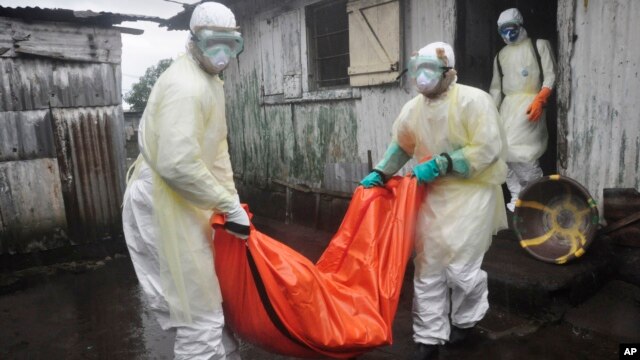In Liberia and Sierra Leone, the two countries hardest hit by the Ebola epidemic, local staff working on the front lines are demanding hazard pay. Bodies are being left in the streets in Sierra Leone as burial teams stop working, saying they haven’t been getting their weekly allowances. In Liberia, thousands of health workers are threatening to strike starting Monday.

The Liberian Health Workers Association said it was calling on its approximately 15,000 members not to go to work starting Monday, October 13.
The union’s Secretary General, George Williams, said they wanted hazard pay, benefits and safe working conditions.
“What we take home is insufficient for the kind of risk and the kind of jobs we do. That we have told our government from time immemorial. Nobody seems to listen to this,” he said.
The union is demanding monthly salaries ranging from $500 to $1,500 depending on the jobs being performed in Ebola treatment units.
The government said it couldn’t pay that much.
Medical staff caring for sick people are at high risk for Ebola, which is transmitted via close contact with infected bodily fluids.
The World Health Organization said at least 348 health workers have gotten Ebola during this regional outbreak and at least 186 of them have died. Half of those cases have been in Liberia.
Many health centers in Liberia shut down in August and remain closed. The union said the government still hasn’t provided the necessary personal protective gear.
Both governments and international NGO’s in Liberia and Sierra Leone rely heavily on locals to staff existing Ebola treatment units and to bury the highly contagious bodies of Ebola victims.
A protracted health workers’ strike in Liberia could impede efforts to open new treatment units to meet the rapidly growing demand. Experts said the caseload was doubling about every month.
The WHO country representative to Liberia, Dr. Peter Graaff, called on the union to hold off on the “go slow” as the strike was called locally.
“This is not the moment to compromise all you have achieved and all your dedication by going slow. Going slow means that the quality of the services is compromised. Going slow means that those who still want to work and want to work hard have to work perhaps too hard and they are going to put themselves at risk. And going slow means putting the lives of those you care for unnecessarily at risk,” he said.
He said the union’s grievances were “a legitimate issue for discussion” and said the government was working on a solution.
Share This Post With Friends To Update Them! Thanks For Visiting!!!

No comments:
Post a Comment
We Love Comment Here. Don't Fail to be a Contributor and not just a Spectator. Your Contribution will go a long way